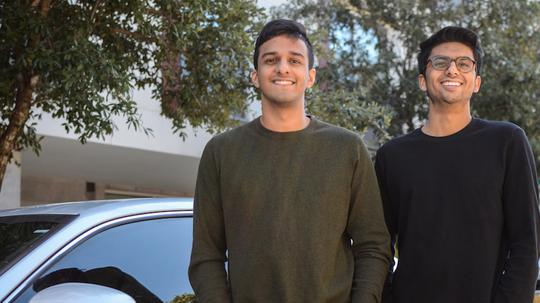
A new ride-sharing service based in Austin has found a way to combine the best elements of traditional hitchhiking with the latest technology. The idea for Hitch started when CEO and co-founder Kush Singh found himself dissatisfied with today’s inter-city travel options.
“There are plenty of ways to travel for $100 or $200 from city to city. There are luxury buses, there are airplanes and there’s numerous options that are half-decent,” Singh said. “But in the economy market for the $20 to $30 price-point for the everyday man or woman there’s not much. There’s Greyhound and there’s Megabus. Riding in those vehicles is absolutely abysmal.”
Together, Singh and co-founder and CTO Tanuj Girish, came up with the concept for Krew, a city-to-city ride-sharing platform that would eventually become Hitch. The duo participated in the Longhorn Startup Lab at the University of Texas at Austin where they connected with Jay Manickam and Matt Chasen, two UT graduates who founded uShip, an Austin-based online marketplace for shipping services.
After running a highly successful startup in Austin, the entrepreneurs left uShip with the goal of investing in the next big idea.
“We partnered up with them and so now they’re the co-founders of this as well,” Singh said.
The original service launched in spring 2018 as Krew, but the foursome is announcing the rebranded and relaunched company, under the new name of Hitch, on Dec. 3.
Hitch aims to make the ride-sharing experience seamless and enjoyable to both the rider and the driver. It is available on iOS and Android via their respective app stores. The founders suggest users visit Hitch.net first to get acquainted with the company and all it has to offer.
Hitch has already made a soft launch and the team is testing its operations. The company is starting with $25 rides from Austin to Houston, but the goal is to expand out into other major cities in Texas.
The name, Hitch, is a throwback to traditional hitchhiking, which was more common only a few decades ago.
“We wanted to leverage the lure behind hitchhiking. To really think about the freedom of travel. Hitchhiking was a great way to connect with people all over the world,” Singh said.
“Contrary to popular belief, hitchhiking was one of the safest ways to travel from city to city,” he added. “However, there a few instances of crimes were perpetuated and brought this sort of public perception of hitchhiking really, really down. What we’re doing now is our model allows people to book with absolutely no scheduling.”
A rider would simply check into the app and see when the next driver would be available, go to a pickup location and wait for the driver to come by. Riders only need to book their rides 45 minutes to an hour before the driver’s arrival.
Unlike other ride-sharing services, Hitch drivers do not need to drop off their customers at individual locations. The idea is that the driver will already be traveling to the intended city and then select an ideal drop-off point for everyone in the car. The driver would also have the discrepancy of dropping off riders at individual locations if the driver does not have to go out of their way.
This way, the driver is monetizing off a drive they were making anyway. The meeting locations are safe and public and will typically be at a Starbucks coffee shop.
“If you think about the model it’s really tech-enabled hitchhiking,” Singh said. “Where two people are meeting exactly along the driver’s route, however, we’ve embedded background checks and safety features into the app, to make sure nothing goes wrong and everyone feels safe in the car.”
Another unique feature of Hitch is the flexibility of service. There are departures every one to two hours.
“You never have to pre-schedule a ride,” Singh said.
The founders decided to begin with the Austin to Houston route because it’s an “extremely dense” and cost-effective route. There are 1.8 billion intercity trips made every day in the US and 90 percent of those trips only have one passenger in the car, they said. The Austin to Houston corridor sees more than 10,000 car trips a day and 90 percent of those are single drivers in a vehicle, they added.
The new partners believe this new business model will ensure Hitch’s success.
“We’ve been watching this rideshare space develop, obviously with Uber and Lyft on the local side, but even back when we launched uShip there were startups pursuing inter-city ride-sharing,” Chasen said.
He and Manickam realized the challenges and opportunities that ridesharing spaces offered.
They saw startups pursue similar business models without significant success.
“Jay and I watching this from afar, had reasoned that there was too much friction for both the rider to post their ride requests days in advance, and for the driver, who is typically willing to offer empty seats in trips their taking for ride-sharing,” Chasen said. “The posting ahead of time and having to schedule specific times to meet riders and pick up riders was just too much friction. It hasn’t really taken off in any meaningful way in the U.S.”
He believes part of this stems from Americans’ love of their own automobiles and their focus on convenience.
Hitch’s business model aims to remove that friction from both the rider and the driver by focusing on the long-distance, middle segment of the trip. (The former business model under Krew, had riders and drivers planning or posting their trips in advance.)
Chasen said he and Manickam joined Hitch during the foundational stage and thus invested some of their own capital into the project as well as helping refine the business model. Girish and Singh were awarded a couple of startup grants via competitions. The team also garnered an investment from Capital Factory in Austin. So far, they have raised about $223,000 in funding.
“With Hitch, we’re embarking on an opportunity that really can make travel much more efficient. What personally drives me crazy, and is why we founded uShip as well, is there is so much unused capacity driving around on our roadway,” he said. “Whether it’s moving shipment, goods, freight or people, technology should be able to solve this problem. I expect it will and can serve to take a lot of cars off the road and help with climate change and other urgent issues that face our society.”







